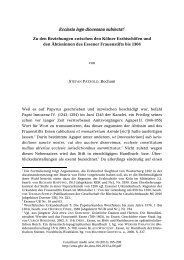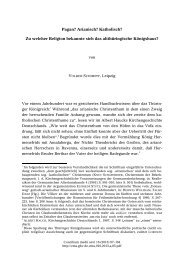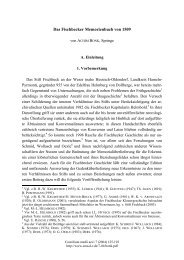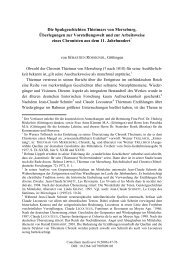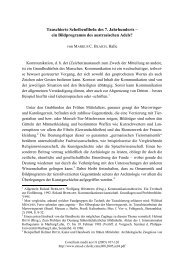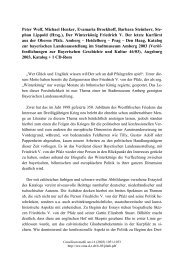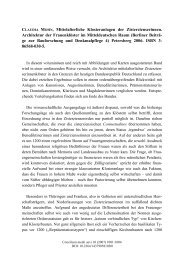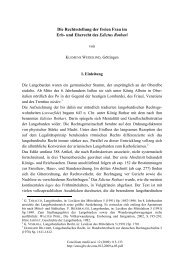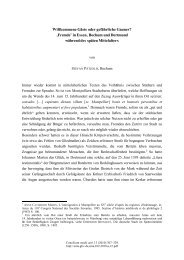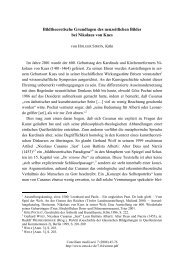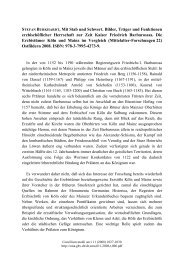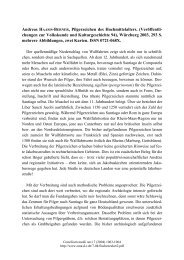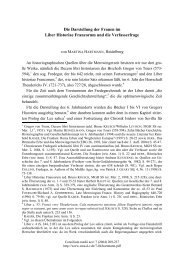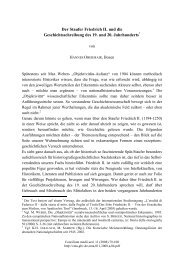Rabanus Maurus - Concilium medii aevi
Rabanus Maurus - Concilium medii aevi
Rabanus Maurus - Concilium medii aevi
Create successful ePaper yourself
Turn your PDF publications into a flip-book with our unique Google optimized e-Paper software.
FEE-ALEXANDRA HAASE: Rhetoric as praise of the emperor<br />
In the art of rhetoric the five parts are: Invention (inventio), disposition (dispositio),<br />
elocution (elocutio), memory (memoria), delivery (pronuntiatio). The inventio is the<br />
finding of true things or things that appear true that lead to the causa probabilis,<br />
dispositio is the distribution of the invented things in a scheme. Elocutio is the<br />
accommodation of the accurate words for the invention. Memoria is the solid<br />
perception of things and words in the mind. Delivery is the moderation of the coice<br />
and body from the dignity of things and words.<br />
For the question of the relation between the king and Alcuin the document Albinus<br />
ad regem is very interesting. The document is a letter of advice in Latin; the first part<br />
is a plain text and the second part put in the scheme of the majuscules A and L. A<br />
codex now in Köln (Köln, Dombibliothek, Codex 106. Darmst. 2106) is a very<br />
interesting manuscript concerning the relation between the scholar Alcuin and the<br />
king. Written about 810 at Werden a. d. Ruhr in the Benediktinerabtei St. Ludger in<br />
Latin in Carolingian minuscules the codex contains in Fol. 2r-59v copies of Alcuin:<br />
Enchiridion (including Fol. 5v De octo vitiis principalibus, Fol. 17r-17v Versus de<br />
contemptu mundi, Fol. 22r-22v Orationes de septem psalmis poenitentialibus, Fol.22v<br />
De oratione dominica, Fol. 23r-26v Alcuinus: Epistola ad pueros sancti Martini de<br />
confessione peccatorum, Fol. 26v Ad regem, Fol. 44r Hymni, Fol. 44v-45r. The<br />
manuscript Ad regem contains no paragraph signs. Words do not close up with line<br />
endings.<br />
Albinus Ad Regem<br />
Fuganda sunt omnimodis et abscidenda ac ferro totoque<br />
artificio separanda: Languor a corpore, imperi-<br />
tia ab animo, luxoria a ventre, a civitate sedicio,<br />
a domo discordia et in commune a cunctis rebus<br />
intemperantia. Amicorum debent esse cuncta com-<br />
munia. Duorumque temporum maxime haben-<br />
da cura mane et vespere: et eorum qui aucturi su-<br />
mus et eorum quae gesserimus. Post deum veritas<br />
maxime colenda.<br />
In the letter Albinus ad regem the king is advised, that the following habits are to be<br />
avoided (fuganda sunt ) in any way:<br />
Inactivity from the body<br />
11



